Call me AJ | Editor for short-form and long-form fiction, nonfiction, and academic writing | Message me for more information | Fonts in header: Rondal by dalerms, Courier New
Don't wanna be here? Send us removal request.
Text
it is honestly amazing how much of writing and editing is just. logistics. like... do i use a name here or a pronoun? if i move this dialogue tag to the middle of this line and break it in half, does the end of the line hit harder that way? what if i move the tag to the front? what if i remove it entirely? ...wait, whose point of view am i in; can i reasonably say this character is appalled, or must i say they look or seem or sound appalled? is this a deliberate action or a step-removed one; is her hand closing on his shoulder, or is she closing her hand on his shoulder? environment environment environment, we need to break all this dialogue up with some narration, the scene is coming untethered. what! are! they doing! with! the rest of their bodies that are not hands! fuck fuck fuck FUCK i forgot we covered this two chapters ago and now i either need to cut this whole chunk or find a reason to reprise the conversation from earlier. name or pronoun? name or pronoun? name or pronoun? move this clause around in this sentence? oh i'll add this phrase-- nope, never mind, past!me added the same phrase two lines down. okay, if i add too much environmental narration it's going to take away from this bit, but not enough and it won't feel grounded. what if i move this to its own line? where the FUCK are their hands?
15K notes
·
View notes
Text
This is a dangerous sentiment for me to express, as an editor who spends most of my working life telling writers to knock it off with the 45-word sentences and the adverbs and tortured metaphors, but I do think we're living through a period of weird pragmatic puritanism in mainstream literary taste.
e.g. I keep seeing people talk about 'purple prose' when they actually mean 'the writer uses vivid and/or metaphorical descriptive language'. I've seen people who present themselves as educators offer some of the best genre writing in western canon as examples of 'purple prose' because it engages strategically in prose-poetry to evoke mood and I guess that's sheer decadence when you could instead say "it was dark and scary outside". But that's not what purple prose means. Purple means the construction of the prose itself gets in the way of conveying meaning. mid-00s horse RPers know what I'm talking about. Cerulean orbs flash'd fire as they turn'd 'pon rollforth land, yonder horizonways. <= if I had to read this when I was 12, you don't get to call Ray Bradbury's prose 'purple'.
I griped on here recently about the prepossession with fictional characters in fictional narratives behaving 'rationally' and 'realistically' as if the sole purpose of a made-up story is to convince you it could have happened. No wonder the epistolary form is having a tumblr renaissance. One million billion arguments and thought experiments about The Ones Who Walk Away From Omelas that almost all evade the point of the story: that you can't wriggle out of it. The narrator is telling you how it was, is and will be, and you must confront the dissonances it evokes and digest your discomfort. 'Realistic' begins on the author's terms, that's what gives them the power to reach into your brain and fiddle about until sparks happen. You kind of have to trust the process a little bit.
This ultra-orthodox attitude to writing shares a lot of common ground with the tight, tight commodification of art in online spaces. And I mean commodification in the truest sense - the reconstruction of the thing to maximise its capacity to interface with markets. Form and function are overwhelmingly privileged over cloudy ideas like meaning, intent and possibility, because you can apply a sliding value scale to the material aspects of a work. But you can't charge extra for 'more challenging conceptual response to the milieu' in a commission drive. So that shit becomes vestigial. It isn't valued, it isn't taught, so eventually it isn't sought out. At best it's mystified as part of a given writer/artist's 'talent', but either way it grows incumbent on the individual to care enough about that kind of skill to cultivate it.
And it's risky, because unmeasurables come with the possibility of rejection or failure. Drop in too many allegorical descriptions of the rose garden and someone will decide your prose is 'purple' and unserious. A lot of online audiences seem to be terrified of being considered pretentious in their tastes. That creates a real unwillingness to step out into discursive spaces where you 🫵 are expected to develop and explore a personal relationship with each element of a work. No guard rails, no right answers. Word of god is shit to us out here. But fear of getting that kind of analysis wrong makes people hove to work that slavishly explains itself on every page. And I'm left wondering, what's the point of art that leads every single participant to the same conclusion? See Spot run. Run, Spot, run. Down the rollforth land, yonder horizonways. I just want to read more weird stuff.
32K notes
·
View notes
Text
One of my favourite questions for figuring out a character’s motivations is which qualities they most fear being assigned to them. Are they afraid (consciously or unconsciously) of being seen as stupid? Ungrateful? Weak? Incompetent? Lazy? Cowardly? Intimidating? Like they actually care? etc.
It’s such a fun way to explore into who they are, why they do what they do, what they don’t do out of fear, and how they might be affected by the events of the story. And I love when characters have negative motivations—trying to avoid something (in this case, being seen a particular way) as much as they’re trying to achieve a goal.
35K notes
·
View notes
Text
not to sound like a boomer, but I need some people to learn how to write emails in a semi-professional (at the very least) format so you're not cold emailing a business/potential employer/any other stranger about formal matters in the exact same way you'd DM a close friend on instagram
the formality/language can loosen up in the email chain once you've established a rapport and you match the other person if they're being less formal, but please don't have the very first email you send a stranger be written in all lowercase ultra-casual sms slang with no greeting or signature and a billion emojis
42K notes
·
View notes
Text
Weekly Grammar Tip: Power of the Period (Literally)
Ever wondered how a tiny dot can make or break your writing? That's the power of the period! This punctuation mark does more than just end sentences. It adds rhythm, clarity, and even drama to your prose. Here are some tips:
Keep It Short and Simple
Long sentences can confuse readers and water down your message. Break up complex ideas with periods for bite-sized, easy-to-digest chunks.
Example:
Before: The alchemist worked tirelessly in his dimly lit laboratory, mixing potions, consulting ancient texts, and conducting experiments late into the night.
After: The alchemist worked tirelessly in his dimly lit laboratory. He mixed potions, consulted ancient texts, and conducted experiments late into the night.
Dodge the Run-Ons
Run-on sentences happen when independent clauses are strung together without proper punctuation or conjunctions. Periods help you avoid these and keep your grammar game strong.
Example:
Before: Lady Isabella entered the room she surveyed the scene with a keen eye.
After: Lady Isabella entered the room. She surveyed the scene with a keen eye.
Spotlight Key Points
Short sentences can emphasize important details and add a dramatic flair. Periods create natural pauses to let your key information shine.
Example:
Before: In the heart of London, amidst the chaos and noise, a secret meeting took place that would change everything.
After: In the heart of London, amidst the chaos and noise, a secret meeting took place. It would change everything.
Mix It Up for Rhythm
A blend of short and long sentences creates an engaging rhythm in your writing. Periods allow you to control this flow and keep readers hooked.
Example:
Before: Elizabeth Thorn, a skilled herbalist, used her knowledge to heal the sick during the Great Plague, her potions and remedies providing much-needed relief to those who were suffering.
After: Elizabeth Thorn, a skilled herbalist, used her knowledge to heal the sick during the Great Plague. Her potions and remedies provided much-needed relief to those who were suffering.
2K notes
·
View notes
Text
The Causal Chain And Why Your Story Needs It
The most obnoxious thing my writing teacher taught me every story needed, that I absolutely loathed studying in the moment and that only later, after months of resisting and fighting realized she was right, was something called the causal chain.
Simply put, the causal chain is the linked cause-and-effect that must logically connect every event, reaction, and beat that takes place in your story to the ones before and after.
The Causal Chain is exhausting to go through. It is infuriating when someone points out that an event or a character beat comes out of nowhere, unmoored from events around it.
It is profoundly necessary to learn and include because a cause-and-effect chain is what allows readers to follow your story logically which means they can start anticipating what happens next, which is what is required for a writer to be able to build suspense and cognitively engage the audience, to surprise them, and to not infuriate them with random coincidences that hurt or help the characters in order to clumsily advance the author's goals.
By all means, write your story as you want to write it in the first draft, and don't worry about this principle too much. This is an editing tool, not a first draft tool. But one of the first things you should do when retroactively begin preparing your story to be read by others is going step by step through each event and confirming that a previous event leads to it and that subsequent events are impacted by it on the page.
28K notes
·
View notes
Text

sharing a very sage bit of advice from The Simpsons' own John Swartzwelder that i've been trying to hamper down in my writing and drawing alike. let your inner crappy little elf do his worst
28K notes
·
View notes
Text
hot take: realism in a work of fiction doesn’t come from being as grim as possible. it comes from detail.
5K notes
·
View notes
Note
Hi! I was wondering if you please explain the function of "it" in sentence "It behooves the athlete to keep his grades up." What is "it"? Thank You!
it's a dummy pronoun or dummy subject! grammatically, english can't have an empty space where the subject should be, so in cases where there isn't really a referent we just plug in this semantically empty word for the syntactic vibe.
1K notes
·
View notes
Text
one time a professor asked me if i’d ever wanted to write anything “more important” than romance. and i said no. i was put on this earth to write about sad people kissing. and if another writer ever came up to me and said they wanted to write 400 pages containing nothing but a character baking a single loaf of bread each day, then i would tell them to do that. people don't write something because it's important. they write about something and that is what makes it important
40K notes
·
View notes
Text
editing is so fun. I'm learning what the story I wrote is about
38K notes
·
View notes
Text
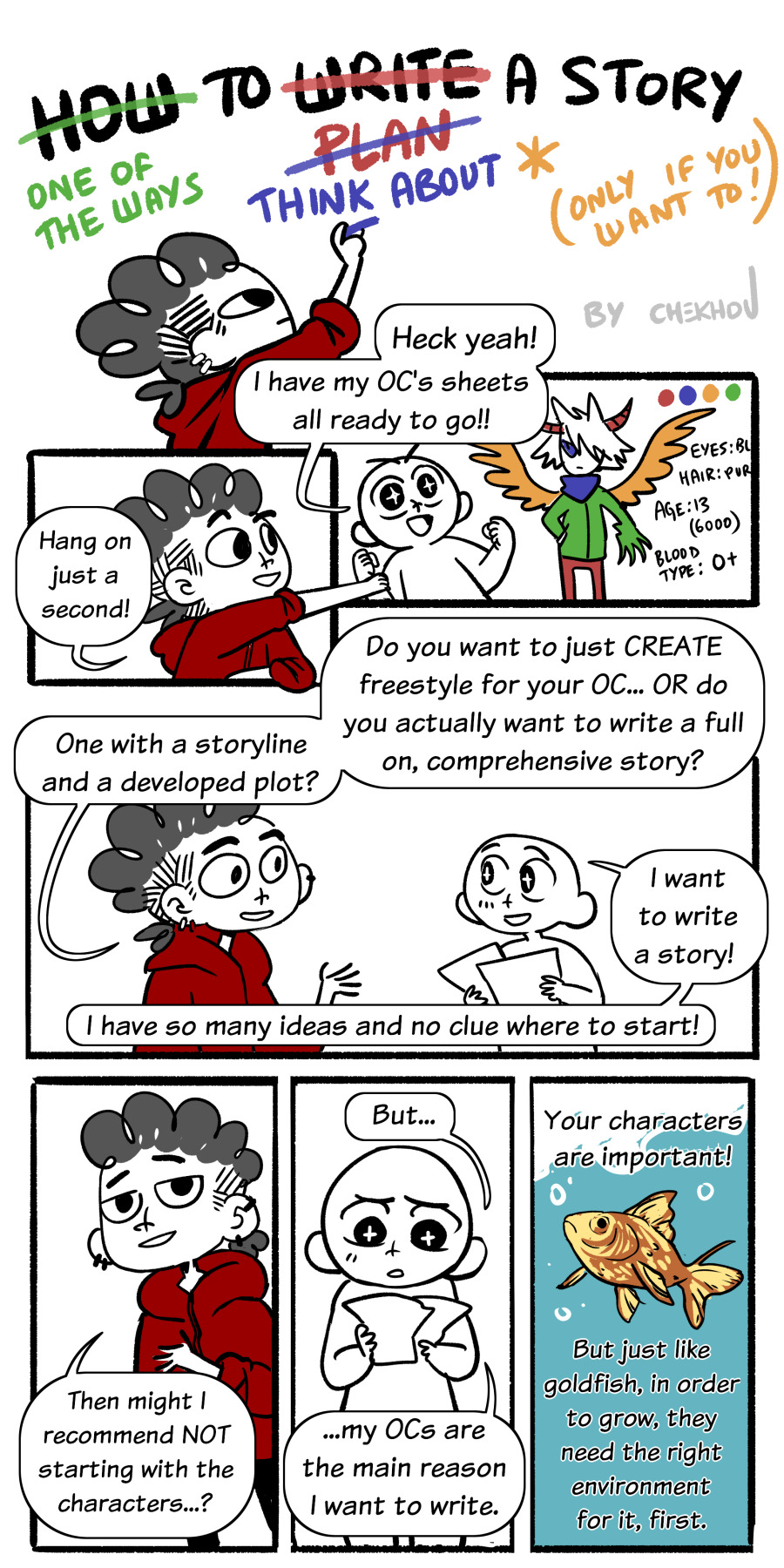
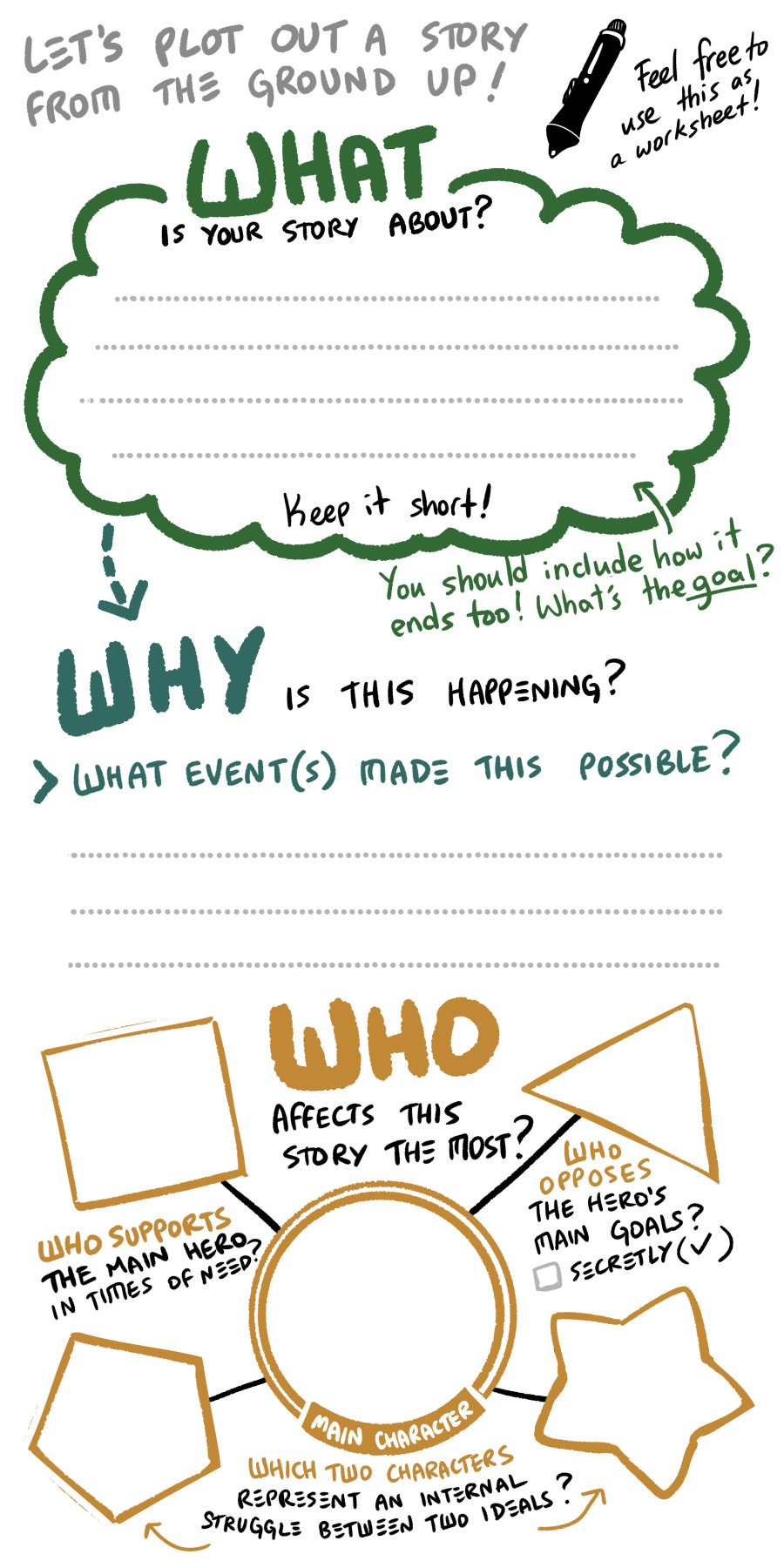
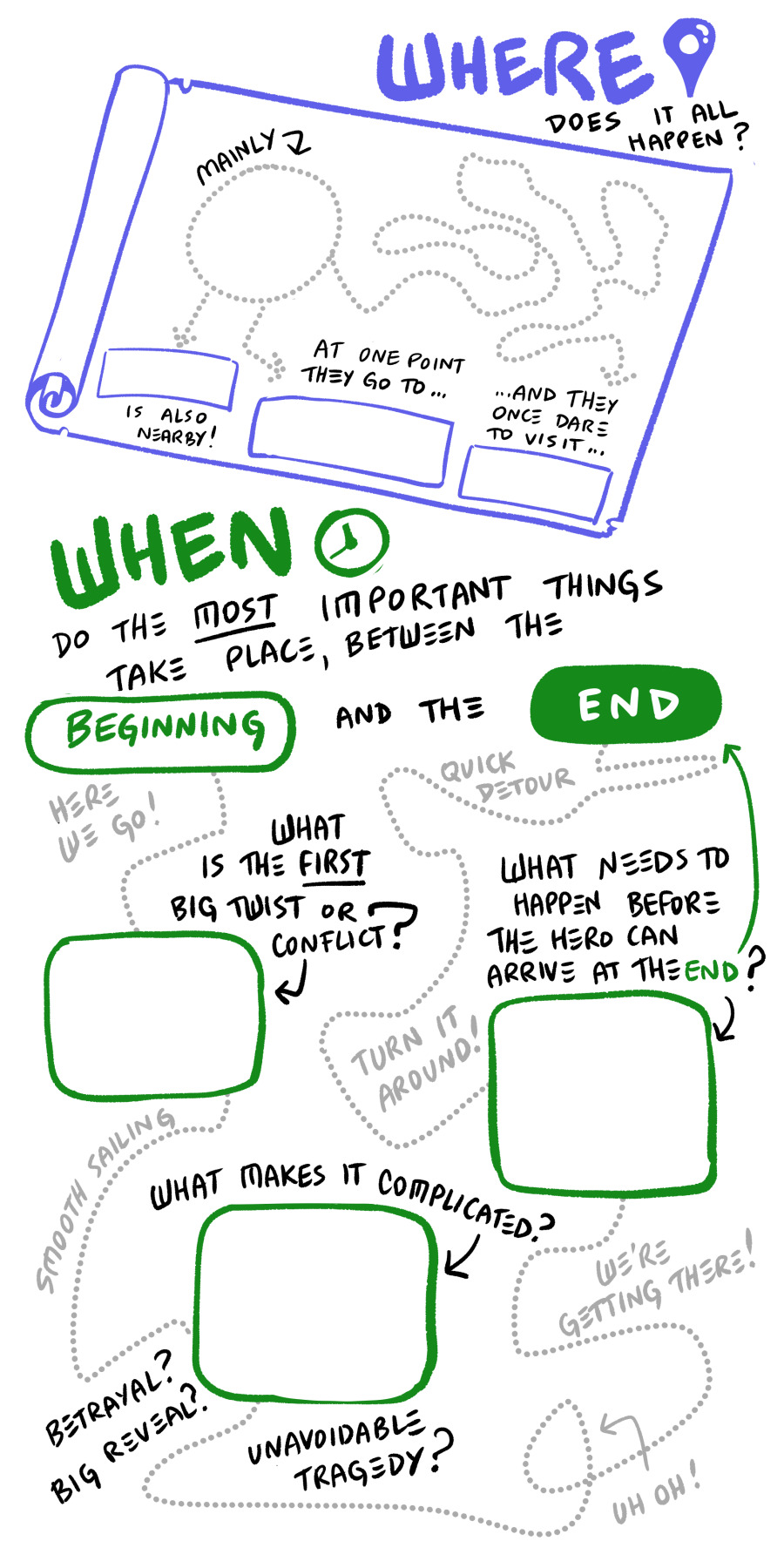
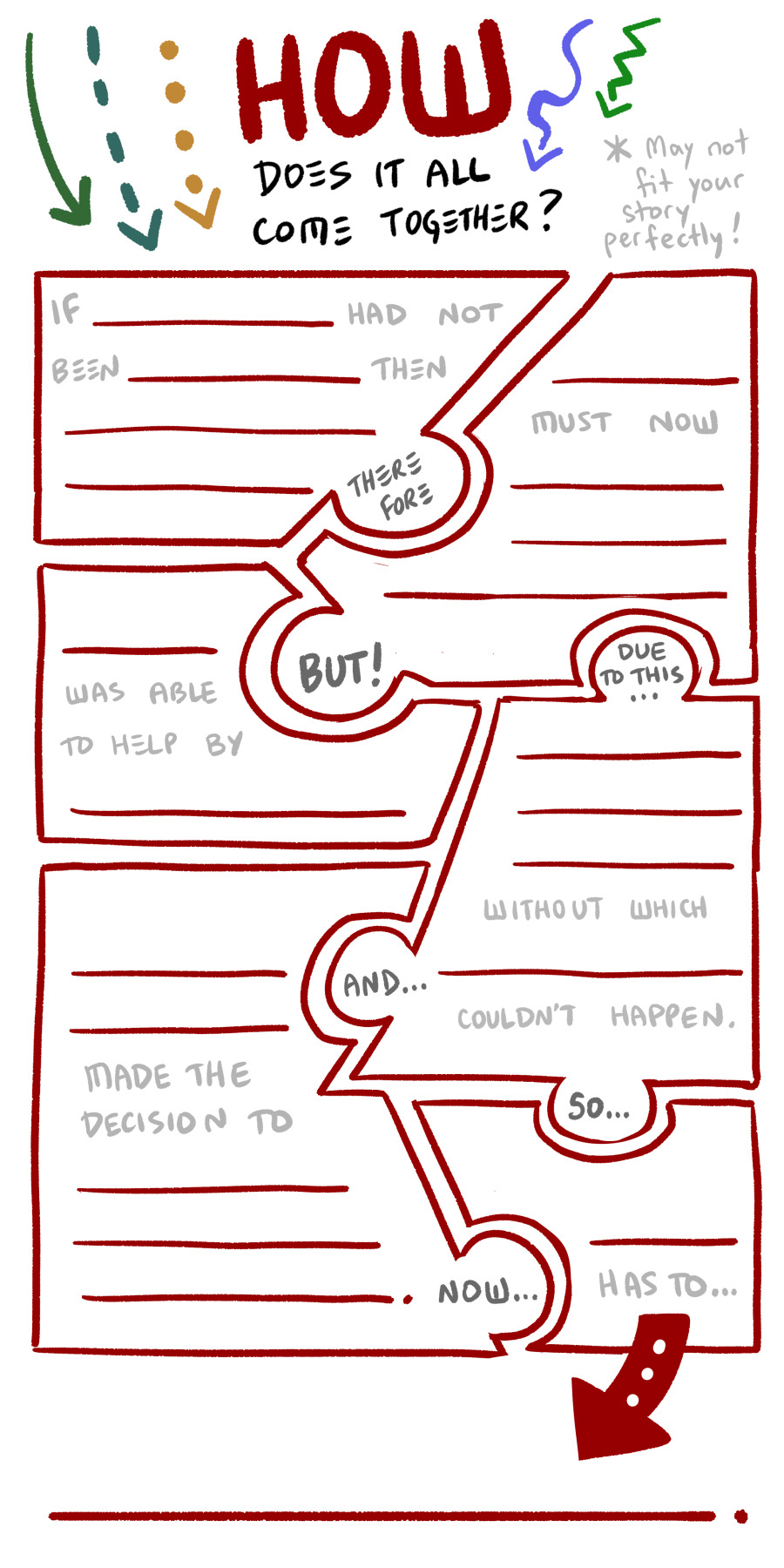
I've had this little idea in my head for a while now, so I decided to sit down and plot it out.
Disclaimer: This isn't meant to be some sort of One-Worksheet-Fits-All situation. This is meant to be a visual representation of some type of story planning you could be doing in order to develop a plot!
Lay down groundwork! (Backstory integral to the beginning of your story.) Build hinges. (Events that hinge on other events and fall down like dominoes) Suspend structures. (Withhold just enough information to make the reader curious, and keep them guessing.)
And hey, is this helps... maybe sit down and write a story! :)
31K notes
·
View notes
Text
Whgskl. Okay.
PSA to all you fantasy writers because I have just had a truly frustrating twenty minutes talking to someone about this: it’s okay to put mobility aids in your novel and have them just be ordinary.
Like. Super okay.
I don’t give a shit if it’s high fantasy, low fantasy or somewhere between the lovechild of Tolkein meets My Immortal. It’s okay to use mobility devices in your narrative. It’s okay to use the word “wheelchair”. You don’t have to remake the fucking wheel. It’s already been done for you.
And no, it doesn’t detract from the “realism” of your fictional universe in which you get to set the standard for realism. Please don’t try to use that as a reason for not using these things.
There is no reason to lock the disabled people in your narrative into towers because “that’s the way it was”, least of all in your novel about dragons and mermaids and other made up creatures. There is no historical realism here. You are in charge. You get to decide what that means.
Also:
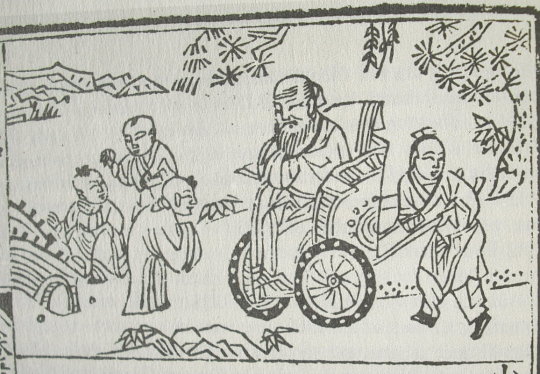
“Depiction of Chinese philosopher Confucius in a wheelchair, dating to ca. 1680. The artist may have been thinking of methods of transport common in his own day.”
“The earliest records of wheeled furniture are an inscription found on a stone slate in China and a child’s bed depicted in a frieze on a Greek vase, both dating between the 6th and 5th century BCE.[2][3][4][5]The first records of wheeled seats being used for transporting disabled people date to three centuries later in China; the Chinese used early wheelbarrows to move people as well as heavy objects. A distinction between the two functions was not made for another several hundred years, around 525 CE, when images of wheeled chairs made specifically to carry people begin to occur in Chinese art.[5]”
“In 1655, Stephan Farffler, a 22 year old paraplegic watchmaker, built the world’s first self-propelling chair on a three-wheel chassis using a system of cranks and cogwheels.[6][3] However, the device had an appearance of a hand bike more than a wheelchair since the design included hand cranks mounted at the front wheel.[2]
The invalid carriage or Bath chair brought the technology into more common use from around 1760.[7]
In 1887, wheelchairs (“rolling chairs”) were introduced to Atlantic City so invalid tourists could rent them to enjoy the Boardwalk. Soon, many healthy tourists also rented the decorated “rolling chairs” and servants to push them as a show of decadence and treatment they could never experience at home.[8]
In 1933 Harry C. Jennings, Sr. and his disabled friend Herbert Everest, both mechanical engineers, invented the first lightweight, steel, folding, portable wheelchair.[9] Everest had previously broken his back in a mining accident. Everest and Jennings saw the business potential of the invention and went on to become the first mass-market manufacturers of wheelchairs. Their “X-brace” design is still in common use, albeit with updated materials and other improvements. The X-brace idea came to Harry from the men’s folding “camp chairs / stools”, rotated 90 degrees, that Harry and Herbert used in the outdoors and at the mines.[citation needed]
“But Joy, how do I describe this contraption in a fantasy setting that wont make it seem out of place?”
“It was a chair on wheels, which Prince FancyPants McElferson propelled forwards using his arms to direct the motion of the chair.”
“It was a chair on wheels, which Prince EvenFancierPants McElferson used to get about, pushed along by one of his companions or one of his many attending servants.”
“But it’s a high realm magical fantas—”
“It was a floating chair, the hum of magical energy keeping it off the ground casting a faint glow against the cobblestones as {CHARACTER} guided it round with expert ease, gliding back and forth.”
“But it’s a stempunk nov—”
“Unlike other wheelchairs he’d seen before, this one appeared to be self propelling, powered by the gasket of steam at the back, and directed by the use of a rudder like toggle in the front.”
Give. Disabled. Characters. In. Fantasy. Novels. Mobility. Aids.
If you can spend 60 pages telling me the history of your world in innate detail down to the formation of how magical rocks were formed, you can god damn write three lines in passing about a wheelchair.
Signed, your editor who doesn’t have time for this ableist fantasy realm shit.
68K notes
·
View notes
Text
Literally cannot emphasize enough that my #1 writing advice is to stop being afraid. Stop being afraid of sounding too cringe, or too stupid, or too horrifying, or too horny, or too weird, or too much, or too little, or too you. You need to put your entire pussy into your art. Sure, it won't be to everyone's tastes, but if you keep yourself to the blandest tamest safest roads possible you will be of no one's tastes, not even yours.
86K notes
·
View notes
Text
Against Lore

For the rest of May, my bestselling solarpunk utopian novel THE LOST CAUSE (2023) is available as a $2.99, DRM-free ebook!

One of my favorite nuggets of writing advice comes from James D Macdonald. Jim, a Navy vet with an encylopedic knowledge of gun lore, explained to a group of non-gun people how to write guns without getting derided by other gun people: "just add the word 'modified.'"
As in, "Her modified AR-15 kicked against her shoulder as she squeezed the trigger, but she held it steady on the car door, watching it disintegrate in a spatter of bullet-holes."
Jim's big idea was that gun people couldn't help but chew away at the verisimilitude of your fictional guns, their brains would automatically latch onto them and try to find the errors. But the word "modified" hijacked that impulse and turned it to the writer's advantage: a gun person's imagination gnaws at that word "modified," spinning up the cleverest possible explanation for how the gun in question could behave as depicted.
In other words, the gun person's impulse to one-up the writer by demonstrating their superior knowledge becomes an impulse to impart that superior knowledge to the writer. "Modified" puts the expert and the bullshitter on the same team, and conscripts the expert into fleshing out the bullshitter's lies.
Yes, writing is lying. Storytelling is genuinely weird. A storyteller who has successfully captured the audience has done so by convincing their hindbrains to care about the tribulations of imaginary people. These are people whose suffering, by definition, do not matter. Imaginary things didn't happen, so they can't matter. The deaths of Romeo and Juliet were less tragic than the death of the yogurt you had for breakfast. That yogurt was alive and now it's dead, whereas R&J never lived, never died, and don't matter:
https://locusmag.com/2014/11/cory-doctorow-stories-are-a-fuggly-hack/
Hijacking a stranger's empathic response is intrinsically adversarial. While storytelling is a benign activity, its underlying mechanic is extremely dangerous. Getting us to care about things that don't matter is how novels and movies work, but it's also how cults and cons work.
Cult leaders and con-artists know that they're engaged in mind-to-mind combat, and they make liberal use of Jim's hack of leaving blank spots for the mark to fill in. Think of Qanon drops: the mystical nonsense was just close enough to sensical that a vulnerable audience was compelled to try and untangle them, and ended up imparting more meaning to them than the hustler who posted them ever could have dreamt up.
Same with cons – there's a great scene in the Leverage: Redemption heist show where an experienced con-artist explains to a novice that the most convincing hustle is the one where you wait for the mark to tell you what they think you're doing, then run with it (scambaiters and other skeptics will recognize this as a relative of the "cold reading," where a "psychic" uses your own confirmations to flesh out their predictions).
As Douglas Adams put it:
A towel has immense psychological value. For some reason, if a strag (strag: non-hitch hiker) discovers that a hitch hiker has his towel with him, he will automatically assume that he is also in possession of a toothbrush, face flannel, soap, tin of biscuits, flask, compass, map, ball of string, gnat spray, wet weather gear, space suit etc., etc. Furthermore, the strag will then happily lend the hitch hiker any of these or a dozen other items that the hitch hiker might accidentally have "lost". What the strag will think is that any man who can hitch the length and breadth of the galaxy, rough it, slum it, struggle against terrible odds, win through, and still knows where his towel is is clearly a man to be reckoned with.
Magicians know this one, too. The point of a sleight is to misdirect the audience's attention, and use that moment of misattention to trick them, vanishing, stashing or producing something. The mark's mind is caught in a pleasurable agony: something seemingly impossible just happened. The mind splits into two parts, one of which insists that the impossible just happened, the other insisting that the impossible can't happen.
You know you've done it right if the audience says, "Do that again!" And that's the one thing you must not do. So long as you don't repeat the trick, the audience's imagination will chew on it endlessly, coming up with incredibly clever things that you must have done (a clever conjurer will know several ways to produce the same effect and will "do it again" by reproducing the effect via different means, which exponentially increases the audience's automatic imputation of clever methods to the performer).
Not for nothing, Jim Macdonald advises his writing students to study Magic and Showmanship, a classic text for aspiring conjurers:
https://memex.craphound.com/2007/11/13/magic-and-showmanship-classic-book-about-conjuring-has-many-lessons-for-writers/
There's a version of this in comedy, too. The scholarship of humor is clear on this: comedy comes from surprise. The audience knows they're about to be surprised when the punchline lands, and their mind is furiously trying to defuse the comedian's bomb before it detonates, cycling through potential punchlines of their own. This ramps up the suspense and the tension, so when the comedian does drop the punchline, the tension is released in a whoosh of laughter.
Your mind wants the tension to be resolved ASAP, but the pleasure comes from having that desire thwarted. Comedy – like most performance – has an element of authoritarianism. You don't give the audience what it wants, you give it what it needs.
Same goes for TTRPGs: the game master's role is to deny the players the victories and treasure they want, until they can't take it anymore, and then deliver it. That's the definition of an epic game. It's one of the durable advantages of human GMs over video game back-ends: they can ramp up the epicness by "cheating" on the play, giving the players the chance to squeak out improbable victories at the last possible second:
https://wilwheaton.typepad.com/wwdnbackup/2009/03/behind-the-screen.html
This is so effective that even crude approximations of it can turn video-games into cult hits – like Left4Dead, whose "Director" back-end would notice when the players were about to get destroyed and then substantially ramped up the chances of finding an amazing weapon – the chance would still be low overall, but there would be enough moments when the player got exactly what they'd been praying for, at the last possible instant, that it would feel amazing:
https://left4dead.fandom.com/wiki/The_Director#Special_Infected
Critically, Left4Dead's Director didn't do this every time. As any showman knows, the key to a great performance is "Always leave 'em wanting more." The musician's successful finale depends on doing every encore the audience demands, except the last one, so the crowd leaves with one tantalyzing and imaginary song playing in their minds, a performance better than any the musicians themselves could have delivered. Like the gun person who comes up with a cooler mod than the writer ever could, like the magic show attendee who comes up with a more elaborate explanation for the sleight than the conjurer could ever pull off, like the comedy club attendee whose imagination anticipates a surprise that grows larger the longer the joke goes on, the successful performance is an adversarial act of cooperation where the audience willingly and unwillingly cooperates with the performer to deny them the thing that they think they need, and deliver the thing they actually need.
This is my biggest problem with the notion that someday LLMs will get good enough at storytelling to give us the tales we demand, without having to suffer through a storyteller's sadistic denial of the resolutions we crave. When I'm reading a mystery, I want to turn to the last page and find out whodunnit, but I know that doing so will ruin the story. Telling the storyteller how the story should go is like trying to tickle yourself.
Like being tickled, experiencing only fun if the tickler respects your boundaries – but, like being tickled, there's always a part where you're squirming away, but you don't want it to stop. An AI storyteller that gives you exactly what you want is like a dungeon master who declares that every sword-swing kills the monster, and every treasure chest is full of epic items and platinum pieces. Yes, that's what you want, but if you get it, what's the point?
Seen in this light, performance is a kind of sado-masochism, where the performer delights in denying something to the audience, who, in turn, delights in the denial. Don't give the audience what they want, give them what they need.
What your audience needs is their own imagination. Decades ago, I was a freelance copywriter producing sales materials for Alias/Wavefront, a then-leading CGI firm that was inventing all kinds of never-seen VFX that would blow people away. One of the engineers I worked with told me something I never forgot: "Your imagination has more polygons than anything you can create with our software." He was talking about why it was critical to have some of the action happen in the shadows.
All of this is why series tend to go downhill. The first volume in any series leaves so much to the imagination. The map of the world is barely fleshed out, the characters' biographies are full of blank spots, the mechanics of the artifacts and the politics of the land are all just detailed enough that your mind automatically ascribes a level of detail to them, without knowing what that detail is.
This is the moment at which everything seems very clever, because your mind is just churning with all the different bits of elaborate lore that will fill in those lacunae and make them all fit together.
SPOILER ALERT: I'm about to give some spoilers for Furiosa.
.
.
.
.
.
.
.
.
FURIOSA SPOILERS AHEAD!
Last night, we went to see Furiosa, the latest Mad Max movie, a prequel to 2015's Fury Road, which is one of the greatest movies ever made. Like most prequels, Furiosa functions as a lore-delivery vehicle, and as such, it's nowhere near as good as Fury Road.
Fury Road hints as so much worldbuilding. We learn about the three fortresses of the wasteland (the Citadel, the Bullet Farm, and Gastown) but we only see one (The Citadel). We learn that these three cities have a symbiotic relationship with one another, defined by a complex politics that is just barely stable. We meet Furiosa herself, and learn something of her biography – that she had been stolen from the Green Place, that she had suffered an arm amputation.
All of this is left for us to fill in, and for a decade, my hindbrain has been chewing on all of that, coming up with cool ways it could all fit together. I yearned to know the "real" explanation, but it was always unlikely that this real explanation would be as enjoyable as my own partial, ever-unfinished headcanon.
Furiosa is a great movie, but its worst parts are the canonical lore it settles. Partly, that's because some of that lore is just stupid. Why is the Bullet Farm an open-pit mine? I mean, it's visually amazing, but what does that have to do with making bullets? Sometimes, it's because the lore is banal – the solarpunk Green Place is a million times less cool than I had imagined it. Sometimes, it's because the lore is banal and stupid: the scenes where Furiosa's arm is crushed, then severed, then replaced, are both rushed and quasi-miraculous:
https://www.themarysue.com/how-does-furiosa-lose-her-arm/
But even if the lore had been good – not stupid, not banal – the best they could have hoped for was for the lore to be tidy. If it were surprising, it would seem contrived. A story whose loose ends have been tidily snipped away seems like it would be immensely satisfying, but it's not satisfying – it's just resolved. Like the band performing every encore you demand, until you no longer want to hear the band anymore – the feeling as you leave the hall isn't satisfaction, it's exhaustion.
So long as some key question remains unresolved, you're still wanting more. So long as the map has blank spots, your hindbrain will impute clever and exciting mysteries, tantalyzingly teetering on the edge of explicability, to the story.
Lore is always better as something to anticipate than it is to receive. The fans demand lore, but it should be doled out sparingly. Always leave 'em wanting more.

If you'd like an essay-formatted version of this post to read or share, here's a link to it on pluralistic.net, my surveillance-free, ad-free, tracker-free blog:
https://pluralistic.net/2024/05/27/cmon-do-it-again/#better_to_remain_silent_and_be_thought_a_fool_than_to_speak_and_remove_all_doubt
1K notes
·
View notes
Text
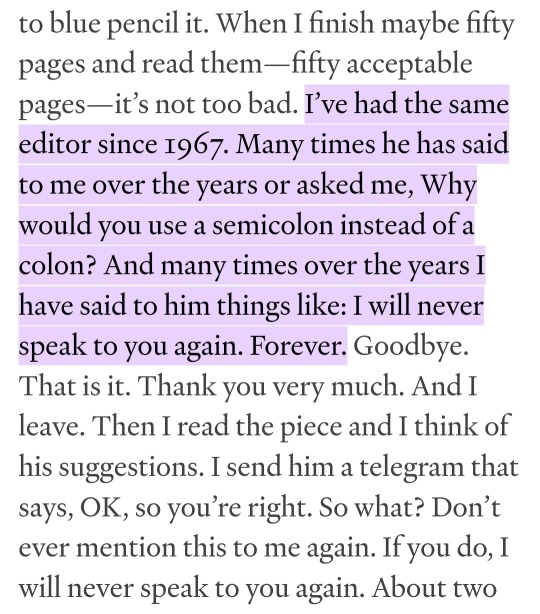
maya angelou saying the funniest thing anyone has ever said about editing, which i can never let myself forget EVER AGAIN [x]
59K notes
·
View notes
Text
One massive, legitimate way to improve as a writer or artist or in any creative endeavor really, is to become absolutely obsessed with something and to allow yourself to be weird about it. Genuinely mean this btw.
73K notes
·
View notes